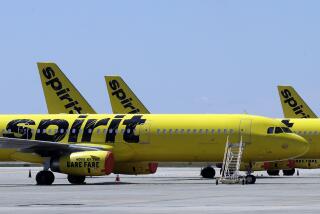High Price for Deregulation
- Share via
So United Airlines’ business plan was rejected by the government as unsound. It’s about time. I don’t mean just the short-term proposal offered by the airline in hopes of securing a taxpayer loan. As a matter of fact, I probably would have voted in favor of such a bailout just because I wouldn’t want to be as uncaring toward airline workers as many of them have been to me.
No, I’m speaking of the larger business strategy that United and other carriers have pursued since airlines became the pioneer among essential-service industries to introduce us to the tortures of deregulation. That goes back to 1978. President Jimmy Carter promised “maximum consumer benefits” when he signed the law that allowed the airline sector of our public transportation system to compete on prices and service.
It wasn’t the first time that a president’s promise turned out to be a scalding blast of hot gas. Virtually every year since deregulation, the airline business has been in one state of chaos or another. Booming and busting, cramming and jamming, devouring and disgorging -- it’s been quite a ride, hasn’t it?
The champions of deregulation insist that this experiment has been a success. We’ve supposedly saved billions in travel costs.
Well, maybe. But at what price? Actually, I think the advantages of airline deregulation are regularly overblown. And the detriments are seldom weighed anymore, even though they should be.
Check me here, but does it make sense that it may soon cost more to park your car at the airport than it does to fly off for a weekend in Las Vegas? True, government regulation can be stifling. But the story of United et al. should be a lesson that go-for-broke deregulation can too.
The underlying theory behind airline deregulation was that competition would make everyone prosper, from investors to airplane builders to the traveling public. In the immutable mathematics of Adam Smith, consumers would rule.
Instead, it’s been a soap opera, and I don’t know many travelers who feel that they’ve been writing the script. United stock at 93 cents a share? Come on.
I remember a day in San Francisco when it would cost me the same to fly to Los Angeles or Belgium. Competition? Yes, we have more airline companies, but few of them have been stable for very long. The business plans of many airline companies never really envisioned competition as the final outcome anyway. They approached it as a dogfight to the death -- undercutting each other and advancing mergers to try to gain control of the market, first at their miserable hubs and then beyond.
Now that this idea has proved a bust, the survivors are all rushing off in another direction -- trying to match discount upstarts that are using regional airports to cherry-pick profitable routes.
Isn’t 24 years of deregulation long enough for a shakeout ride?
Not so long ago, a couple who planned their vacation in advance wound up spending a fraction of what another traveler paid to hurry home because Grandpa had a heart attack. Now, the advantage goes to those daredevils who are willing to wait until the last instant to scoop up a cut-rate fare for an empty seat. Great fun, I guess, for those who have nothing better to do than work the tedious system. They’re the ones who change telephone providers 10 times a year to save $40 and then bore you at cocktail parties with the banalities of it.
But is this any way to run a railroad, really?
Long ago, by majority rule, we made our decision. Deregulation of air travel would be about price competition and nothing else. But we pay for it in discomfort, with anxiety and by indignities that dehumanize the travel experience. And we’re all part of a downward spiral to depress wages and living standards.
Zealots would have us believe that we could not have achieved any of this “progress” had we preserved some regulatory control of our public skies. But I wonder. Somehow, the airline business made it from tri-motors to jets in partnership with government. Now is as good a time as any to ask whether we shouldn’t reclaim a public hand in restoring sanity and dependability to a system that has turned on us and turned us mean.
The crash of United is causing misery for thousands of employees and their families, as well as investors, travelers and communities that depend on the company. That’s no American success story. It doesn’t have to be this way.
More to Read
Inside the business of entertainment
The Wide Shot brings you news, analysis and insights on everything from streaming wars to production — and what it all means for the future.
You may occasionally receive promotional content from the Los Angeles Times.










